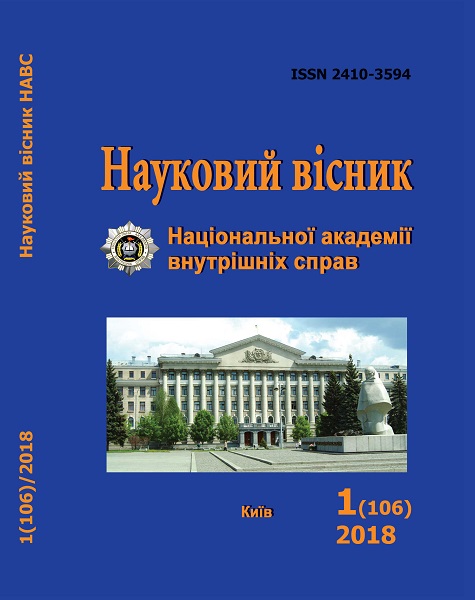Conducting Covert Investigative (Detective) Actions in Respect of a Person with the Personʼs Consent
Abstract
The practicability of establishment of a simplified procedure order of covert investigative (detective) actions in respect of a person who is their subject are substantiated. The proposal for amendments and additions to the Criminal Procedure Code of Ukraine in terms of covert investigative (detective) actions in respect of a person with the person’s consent or initiative are given.
Proposed in the Art. 246 of the CPC of Ukraine states that any covert investigative (detective) actions in respect of the concrete person, as well as his/her property, may be conducting with the person’s consent on the basis of the investigator’s or prosecutor’s order ‒ without a decision of investigating judge.
It is substantiated that public relations connected with ensuring the security of persons involved in criminal proceedings should be regulated not by a special law but by a separate chapter within the CPC of Ukraine. Among other things, it should be noted that to ensure the security of persons involved in criminal proceedings in respect of a person with the person’s consent (or initiative), and his/her property, shall be conducted covert investigative (detective) actions specified in Art. 260‒264, 267‒270 of the CPC of Ukraine.
It is also necessary to standardize that the facts obtained during such actions may be used as evidence in criminal proceedings on the grounds and in the manner prescribed by the CPC of Ukraine.
Proposed the rules of Part 2 of the Art. 246, as well as the Art. 268, 269 and 270 of the CPC of Ukraine should be to emphasize that the location of the radio electronic device; observing a person, thing or place; audio, video control of the place was sufficient to take the investigator’s or prosecutor’s decision.
Downloads
Abstract views: 117 PDF Downloads: 438
- Authors reserve the right to authorship of their own work and transfer to the magazine the right of the first publication of this work under the terms of the Creative Commons Attribution License, which allows other persons to freely distribute published work with mandatory reference to authors of the original work and the first publication of an article in this magazine.
- Authors have the right to enter into separate additional agreements on non-exclusive dissemination of the work in the form in which it was published in the journal (for example, to post an article in the institution's repository or to publish as part of a monograph), provided that the link to the first publication of the work in this journal is maintained.
- The journal's policy allows and encourages the posting of articles by authors on the Internet (for example, in electronic storehouses of institutions or on personal websites), both before the submission of this manuscript to the editorial office and during its editorial processing, as this contributes to the creation of a productive scientific discussion and positively affects the efficiency and dynamics of citing the published work.




